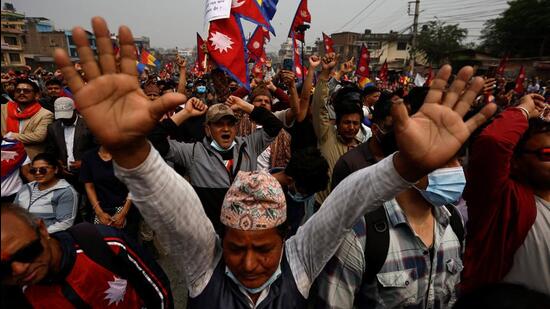The return of Nepal’s monarchy would cause political instability and harm both Nepal and India, former Prime Minister Baburam Bhattarai said during a visit to New Delhi on Monday. Bhattarai, who helped Nepal become a republic in 2008, spoke at the Press Club of India, highlighting the risks of bringing back the monarchy.
Bhattarai explained that Nepal’s monarchy was never truly constitutional but remained autocratic. He blamed the current wave of pro-monarchy protests on the government’s failure to meet people’s needs, rather than on a genuine desire for royal rule.
Monarchy Would Only Bring Instability
“How will the restoration of an autocratic monarchy in Nepal benefit India? It will only lead to instability,” Bhattarai said during his talk. He stressed that there is no major public support for the monarchy’s return.
Bhattarai reminded the audience that millions of Nepalis had protested to remove the monarchy in the 1990s. In contrast, he noted that only about 20,000 people had participated in the recent rallies supporting former King Gyanendra Shah.
“What is dead cannot be resurrected. We will move forward,” Bhattarai declared. He added that this political situation should be used as a chance to move Nepal’s society ahead.
Nepal’s Path Towards Democracy
Nepal ended its monarchy and became a secular, democratic republic in 2008 after a decade-long civil war led by Maoist rebels. Bhattarai, who served as prime minister from 2011 to 2013 and now leads the Nepal Socialist Party, emphasized that the country’s democratic achievements must be protected.
“Going back from democracy is not the solution. Deficiencies in the Constitution can be addressed,” he said.
Bhattarai highlighted that while Nepal’s political system is not perfect, reforms can be made to strengthen democracy. He argued that any attempt to return to monarchy would only create more problems and set back Nepal’s progress.
Recent Protests and Their Impact
In March, pro-monarchy protests broke out across several parts of Nepal, including Kathmandu. These demonstrations left two people dead and dozens injured. Supporters of former King Gyanendra Shah called for the return of the monarchy and the restoration of Nepal’s status as a Hindu state.
Some political leaders in Nepal, including Prime Minister KP Sharma Oli, expressed concerns about a possible Indian influence behind the protests. However, Bhattarai refused to comment on whether India had any role in supporting the demonstrations. He simply stated that reviving the monarchy would be “non-productive.”
Nepal’s Relationship with India and China
Bhattarai also discussed Nepal’s foreign relations, especially with India and China. Responding to questions, he made it clear that Nepal remains much closer to India in economic terms.
“According to the latest figures, 67% of our trade is with India and only 14% is with China,” he said.
Bhattarai added that there is a common misunderstanding that Nepal uses its ties with China as a way to pressure India. He dismissed this idea, saying, “No Nepalese leader will be so foolish as to use this as a card.”
He noted that Kathmandu depends heavily on New Delhi for trade, transit, and other key economic activities. Strengthening relations with India is essential for Nepal’s prosperity.
Political Reforms for Stability
During his visit, Bhattarai met with India’s Defense Minister Rajnath Singh, as well as leaders from the ruling Bharatiya Janata Party (BJP) and the opposition Congress Party. He discussed Nepal’s internal challenges, particularly the ongoing political instability.
Bhattarai described the instability as the result of an “unfinished revolution” and outlined his party’s proposal for a more stable government system.
He suggested that Nepal should adopt a directly elected presidential system and a fully proportional but directly elected Parliament. According to him, such changes would create a balance of power and help stabilize the government.
The Way Forward
Bhattarai stressed that Nepal cannot move forward without strong relations with India. He called for high-level talks between the prime ministers of both countries to solve unresolved issues, including longstanding border disputes.
He emphasized that solving these problems would bring long-term benefits to both sides. Good neighborly ties, based on respect and cooperation, would help Nepal in its development journey.


